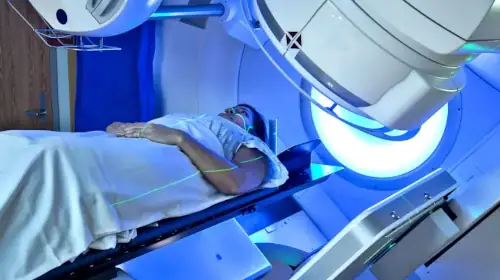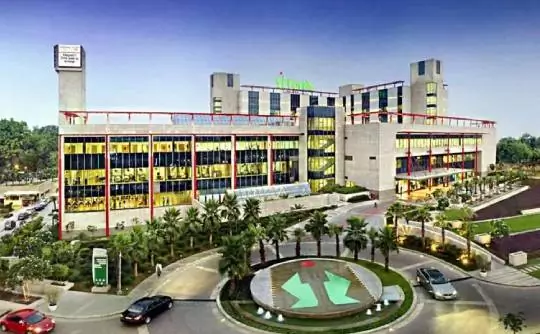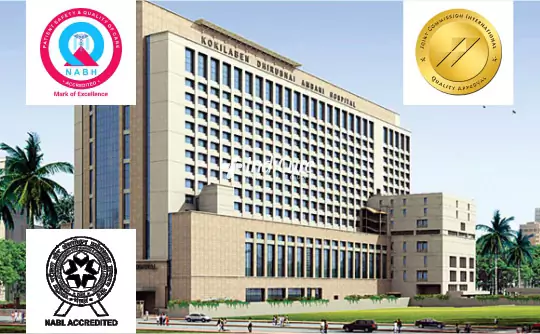

The Gamma Knife Surgery Cost in India starts at approximately USD 6,200, but it can vary based on several factors, including the patient's medical condition and history, any existing comorbidities, the surgeon's expertise, the choice of surgical facility, and the city where the procedure is performed.
It is important to note that this is an estimated figure and should not be taken as the definitive Gamma Knife Surgery Cost in India. The precise cost will be determined after a thorough evaluation by the surgeon. Furthermore, the cost in Indian Rupees may vary depending on the prevailing exchange rates.
Selecting an accredited surgical center with experienced and qualified medical professionals is essential for the success of gamma knife surgery in India. Major cities like Mumbai and Delhi boast state-of-the-art medical infrastructure and access to highly skilled surgeons, which can contribute to higher gamma knife surgery cost in India. To ensure top-notch care and patient safety, IndiCure Health Tours collaborates with leading surgical facilities in these metropolitan hubs.
One of the key factors influencing the gamma knife surgery cost in India is the neurosurgeon's fee. IndiCure Health Tours partners with board-certified surgeons renowned for their extensive experience and proven success in performing complex procedures. While the surgeon's fee may vary based on their expertise and reputation, IndiCure ensures you are connected with professionals who prioritize your safety and deliver outstanding results for your gamma knife surgery in India.
Surgery-related costs encompass both pre-operative and post-operative expenses. Pre-operative costs depend on factors like the patient's age and medical condition, which dictate the required investigations and their complexity. Post-operative expenses typically include prescribed medications and follow-up consultations to monitor recovery.
At IndiCure Health Tours, we combine the majority of expenses for your gamma knife surgery in India, offering an all-inclusive and budget-friendly package that is customized to your specific needs and financial requirements. Once we receive your medical reports, your dedicated case manager will provide an estimated gamma knife surgery cost in India based on discussions with the surgeon.
The final gamma knife surgery cost in India, however, will be confirmed after your in-person consultation with the surgeon.
We at IndiCure, understand that you travel with a budget in mind and do not like to be greeted by surprises after arrival in India. We thus club all these expenses and give you the package cost that is inclusive and affordable at the same time.
Your case manager shall give you an estimated cost of your surgery after discussing your medical reports with the surgeon. The final cost, however, shall be confirmed after your consultation with the Surgeon.

We Help you Choose the Right Treatment, Surgeon & Hospital

We Arrange Video/Telephonic Consultation with the Surgeon

We Assist you with Visa & Accommodation

We Receive you at the Airport and Drop you at Hotel/Hospital

We Assist you the at Hospital & Provide Post Operative Support
IndiCure Health Tours ensures exclusive savings on your medical travel to India. We partner with top hospitals to negotiate special rates, ensuring you get the best possible price on your healthcare when you plan your medical travel with us.

Here is a set of questions you should consider asking before commencing your journey for gamma knife surgery in India.
Prepare to answer questions about your:
Gamma knife radiosurgery is now one of the most accepted and widely used radiosurgery treatments in the world for brain tumors or cancers. About half a million people have been treated with Gamma knife surgery, and it's the only Radiation Therapy System cleared by the FDA for irradiating brain metastases.
Gamma knife surgery, despite the name, there is no blade or knife - it's called Gamma knife because radiosurgery (one-session treatment) has such a dramatic and precise effect in the target zone that the changes are considered 'surgical.' So there's no incision or blood, and minimal risk of complications.
Gamma knife is a type of stereotactic radiosurgery that uses strong doses of gamma radiation to treat the part of the brain suffering from the disease. The radiation, though powerful, is precise enough that it does not cause any harm to the surrounding healthy brain tissue. It is meant to target only the diseased brain cells.
Gamma knife surgery is effective in the treatment of brain tumors which can be benign or cancerous. It is also widely used for treating arteriovenous malformations in the brain and other neurological dysfunctions like trigeminal neuralgia.
Gamma knife radiosurgery is a non-invasive and non-surgical procedure as it does not involve any cutting of the tissue and is a highly advanced method of radiation therapy that emits high energy beams of gamma radiation to effectively kill the small tumors.
The deep tumors, blood vessel abnormalities and other nervous system problems that neurosurgeons found difficult to tackle with the scalpel due to the location or posed a high risk to the patient can now be treated with gamma knife surgery. It has thus given new hope to patients suffering from brain tumors, Arteriovenous malformations and other functional disorders of the brain.
Gamma knife surgery is used to treat a wide array of problems in the brain. It is most commonly indicated in conditions that include:
After the FDA's approval for a gamma knife to treat brain disorders, the gamma knife is the most preferred choice for brain disorders among patients and doctors worldwide. However, due to the non-availability of gamma knives in various countries and the very high cost of treatment in Western countries, gamma knife treatment in India offers great value for patients across the world. Not only is gamma knife surgery cost in India much more affordable, but you get treated by top neurosurgeons in the world.
The Gamma Knife procedure is entirely non-invasive, involving no incisions or cutting, and does not require the use of anesthesia. It is performed as an outpatient procedure, allowing patients to return home the same day. For the Gamma Knife to work, radiation energy is directed directly through the skull and into brain tumors.
During the treatment, up to 192 carefully focused, low-intensity radiation beams are precisely directed at the tumor. This technique ensures that the tumor is targeted and destroyed by the radiation while surrounding healthy tissue remains unharmed. The key advantage of this procedure is that patients can begin treatment immediately.
Gamma Knife can be used to target problematic locations besides brain tumors because of the radiation's accuracy in precisely locating the target. Other brain problems, non-cancerous pituitary tumors, tumors of the ear or eye nerves, and abnormalities of the blood vessels in the brain have all been effectively treated using the Gamma Knife.
The Gamma Knife can treat multiple tumors. In a single session, it can target and treat anywhere from 15 to 20 tumors, or this can be achieved over the course of several sessions. This capability is beneficial for patients with multiple brain tumors, as it allows for efficient treatment without the need for multiple separate procedures.
Patients with the following conditions are most likely to benefit from Gamma Knife surgery: Meningiomas (non-cancerous tumors) brain cancer or metastatic brain tumors. brain tumors that are malignant, such as gliomas or glomus tumors. Besides, Arteriovenous malformations, trigeminal neuralgia, auditory neuroma, and tremors are all treated using gamma knife surgery.
Before you undergo gamma knife radiosurgery, your surgeon would advise you to undergo several tests which include MRI, CT and pathology tests depending on which your surgeon will base the final decision.
Depending on the size and location of the tumor a stereotactic face mask, which is custom made, to fit your face perfectly is used during the session to hold your head still. After this, you need to undergo the imaging scans wearing the facemask. After the scan, the surgeon will plan the exact dosage of radiation to be given depending on the nature of your tumor.
Using the latest CT and MRI imaging, the surgeon can accurately assess the tumor's size, shape, and location. This detailed information helps determine the precise dosage of radiation required, as well as the optimal size and configuration of the radiation beams. The surgeon will also calculate the number of beams needed and their angles.
The radiation machine is calibrated according to the specific treatment plan designed for your case. You'll be asked to lie back and relax on the treatment table. If any slight adjustments to your position are needed, stereotactic X-rays and laser technology are used to make exact corrections, ensuring that the radiation is accurately directed to the tumor.
After positioning the patient in the right way, the surgeon will leave the room and operate the machine from the control room. The machine will make a slight noise and shall move around your head to deliver the radiation beam in one or more directions. The treatment takes 30 minutes or longer depending on the number of targets.
Gamma Knife has an excellent success rate, especially for specific site tumors, which is as high as 85-90%. It also has a very high success rate for AVM, for which Gamma knife radiosurgery is the treatment of choice. Research suggests the obliteration rate for AVMs treated radio surgically through Gamma knife to range between 80 and 90 percent upon two-year follow-up. The procedure has similar high success rates for Trigeminal Neuralgia and other conditions.
Gamma knife radiosurgery offers a more favorable quality of life - during and after the procedure, as compared to conventional surgery.
Recovery is very swift and pain-free after the gamma knife treatment. You may experience a mild headache for a few hours after the procedure, which is quite common and often occurs as you have not eaten anything. The gamma knife radiosurgery in India is completed in a single session and does not require more than a few hours. Most of the patients are able to resume their routine activities within 24-48 hours of the procedure with specific instructions given by the surgeon.
The patient can leave the hospital either on the day of surgery or needs a maximum overnight stay for observation. The patient can resume normal activities almost immediately.

Gurgaon
Fortis Memorial Research Institute (FMRI), the flagship hospital of Fortis Healthcare, is a multi-specialty, quaternary care hospital and is counted among the best hospitals in India and the world. The hospital is considered as "Mecca of Healthcare" and a referral hospital, not only in the entire Asia Pacific but much beyond.

Mumbai
Kokilaben Dhirubhai Ambani Hospital is one of the most advanced and modern hospitals in India. It is a state-of-the-art tertiary care multi-specialty hospital located in the biggest suburb of Mumbai- Andheri. The hospital was launched by Reliance Group in 2008.
The Gamma Knife procedure itself is painless. You won't experience any discomfort throughout the treatment, nor will there be any heat or noise. During the procedure, you're welcome to take a nap or listen to music.
Your head frame is removed. (if you had an external rigid head frame). An antibiotic ointment and bandages are applied after hydrogen peroxide is used to clean the pin sites. You'll be given medicine if you get a headache, nausea, or vomiting. You will be kept under observation before you are sent to your room/discharged.
For a week, keep your head elevated on a few cushions. If you've had an external head frame, this aids in reducing pressure within your head as well as swelling at the pin sites.
You can wash your hair and scalp 48 hours after the procedure. This enables the pin sites to start healing and stops the wounds from becoming infected. After your treatment, you can take off the bandages from the pin locations the next morning. Utilize hydrogen peroxide or mild soap and water to wash the locations twice each day. Then, for three to four days, dab the pin sites lightly with an antibiotic ointment such as neosporin or bacitracin. It is adequate to cover the pin locations with bandages for two to three days.
Despite the procedure's generally low risk profile, complications or adverse effects from Gamma Knife surgery could include:
The advantages of Gamma Knife surgery over conventional surgery are numerous. Surgery with a gamma knife
The size, location, kind, and history of your individual medical condition are among the elements that affect how well the Gamma Knife surgery goes. Before starting treatment, talk to your radiation oncologist and neurosurgeon about your expectations and prognosis.
The tumor or lesion is intended to be stabilized, shrunk, or destroyed using the Gamma Knife technique. You may or may not require additional Gamma Knife therapy or conventional, now-more-manageable surgery, depending on your health. Follow-up CT and/or MRI scans will be performed to monitor your response to treatment.
To fully experience the results of treatment, it may take a few weeks, months, or perhaps a year (or even longer). For instance, trigeminal neuralgia sufferers may experience pain relief at any period between one day and six months, however most patients experience relief within a month. Over a period of weeks to months, cancerous tumors normally stabilize or shrink. The primary objective of many non-cancerous tumors is to stop their growth promptly, however they may not shrink in size. After treatment, arteriovenous malformations may take two to three years to disappear.
Nearly 90% of brain tumors are successfully eliminated, reduced in size, or their growth is stopped with gamma knife radiosurgery.
Without the necessity for an incision, the gamma radiation beams deliver a very powerful dosage of radiation to a tiny area. Cells are destroyed by radiosurgery so they can't proliferate. Over time, a lesion or tumor will get smaller.
No, you don't lose hair with gamma knife treatment.
Although you will be sedated, you will be awake during the radiosurgery. Your arm will be given an IV before the procedure. Then, medication is given to you via this IV to promote relaxation.
When planning for gamma knife surgery in India, it's important to consider more than just the cost of the surgery itself. There are several additional expenses that should be factored into your overall budget to ensure a smooth and stress-free experience.
First, you will need to account for meals throughout your stay. While some medical packages may include meals, it's advisable to budget for additional dining expenses depending on your preferences and dietary requirements.
Airfare is another significant cost, and it can vary depending on your location, the time of booking, and the class of travel. It's best to book flights well in advance to secure the most affordable rates.
Ground transportation expenses also need to be considered, such as taxi fares, private transfers, or rental cars. Transportation from the airport to your accommodation, as well as between the hospital and your hotel for follow-up appointments, should be factored into your travel budget.
Lastly, accommodation costs will be an essential part of your planning. Whether you choose a hotel near the medical facility, a long-term stay option, or another form of lodging, your accommodation will play a vital role in your comfort during the recovery period. Prices will vary based on location, quality, and amenities.
By taking these additional expenses into account—airfare, meals, transportation, and accommodation—you can create a comprehensive budget for your trip to India. This will help ensure that you're well-prepared for both the surgery and your recovery, allowing you to focus on healing and experiencing a comfortable, successful medical journey.
Enhance your medical journey to India by availing these extra services.
Traveling abroad for medical reasons may be challenging. With our experience of over a decade and working with the best surgeons and top hospitals in India, we help make your medical tour easier and safer for you. We will guide you at every step of the way and make end-to-end arrangements for your surgery, travel, and stay.
Ramandeep Dhaliwal
I had great experience having rhinoplasty through Indicure. Dr. Ruchika from Indicure has helped me in finding best plastic surgeon, answering all my questions...
Read More
Joshua Archer
My name is Joshua Archer I'm from New Zealand, bay of plenty, kawerau I opted for the bypass surgery in January 2023 but planned it in advance for 28 September found IndiCure...
Read More
Kera Ren
Absolutely loved my experience with IndiCure - from first inquiring to meeting the surgeon pre op to my follow up post op. The surgeon was extremely approachable...
Read More
Andreana Paul
Had a wonderful experience. Visited India for my plastic surgery. From sending mails, airport pickup, comfortable accommodation and, to smooth hospital appointment booking...
Read More
Brandi Luce
I had the privilege of using Indicure's services for a cosmetic procedure that I had wanted for a long time but had always been apprehensive about. Ruchika helped me...
Read More
Jade M
Indicure Health Tours went above and beyond my expectations. They helped me with every aspect of my journey and were professional, kind and caring. I was...
Read More
The content on the website (www.indicure.com) is intended to be general information and is provided only as a service. All photographs on our website of before and after results are examples only, and do not constitute an implied or any other kind of certainty for the result of surgery.
Learn about IndiCure Health Tours' comprehensive editorial policy that strives to deliver trustworthy, helpful, relevant, accurate and people-first content on medical tourism in India.
It is not medical advice and should not be taken as medical advice. It should not be used to diagnose or treat a health condition and is in no way meant to be a substitute for professional medical care. You are advised to see a surgeon in person to assess what surgery may or may not accomplish for you.
It is also important to keep your expectations realistic and to understand that all surgical procedures carry risks and should never be taken lightly.